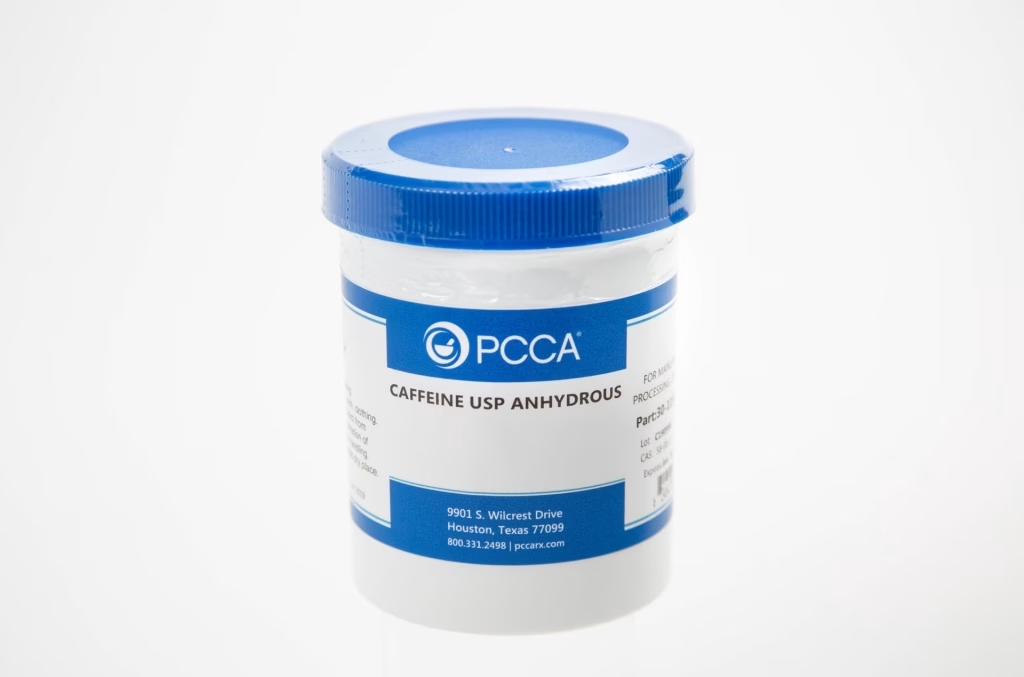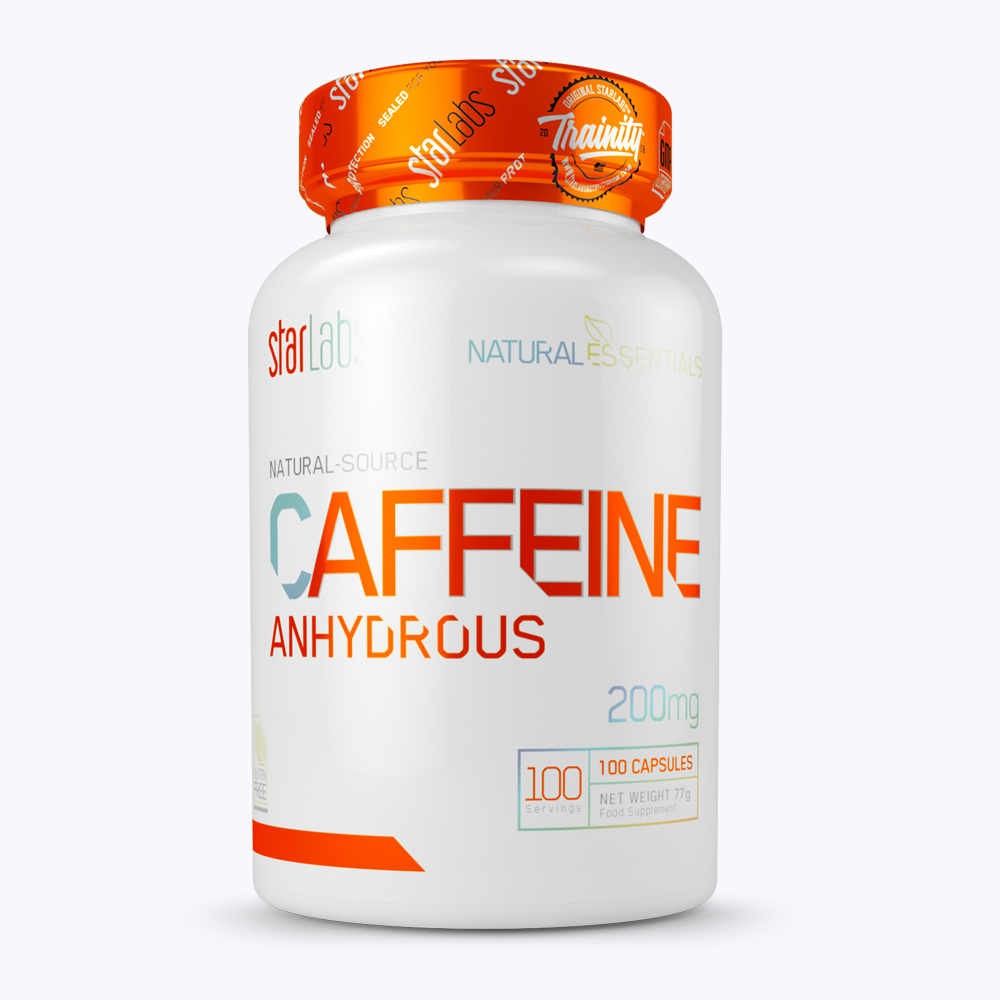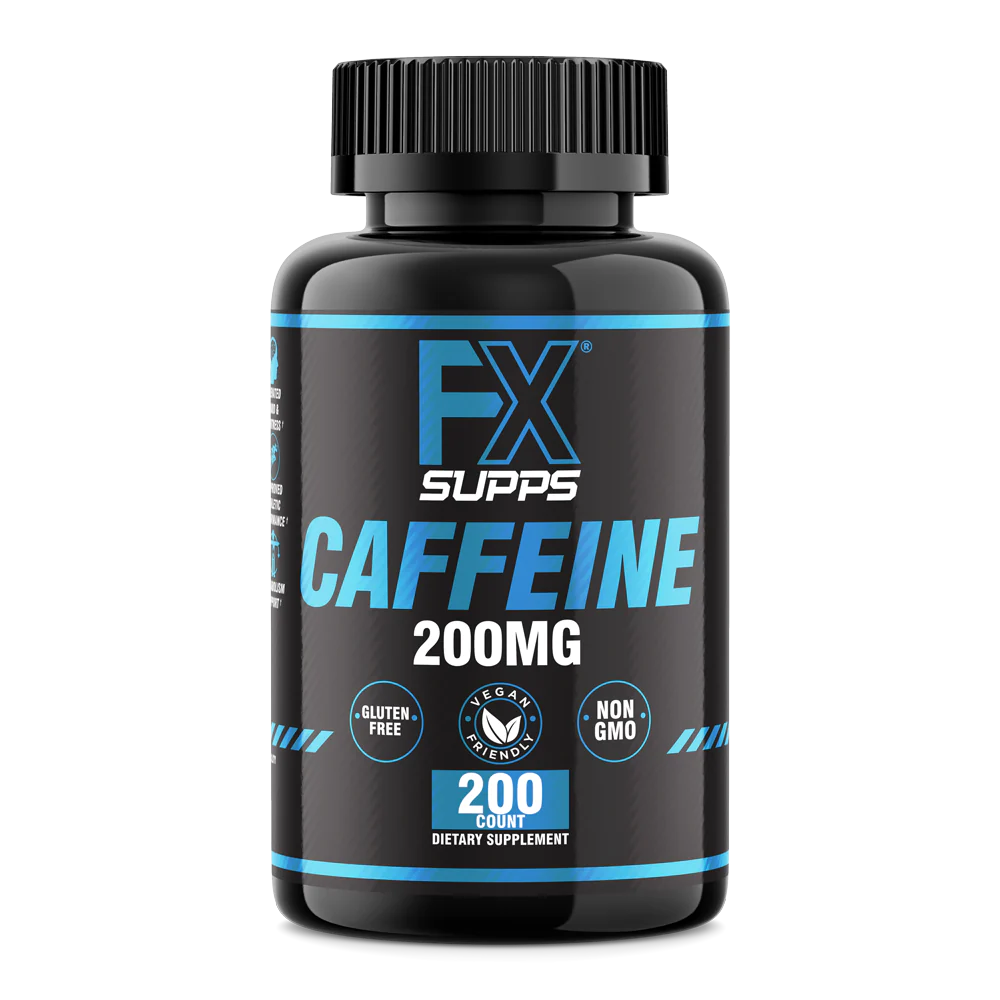What’s Caffeine Anhydrous ?

Caffeine is a naturally-occurring central nervous system stimulant found in approximately sixty plant species. The most common sources for natural caffeine are the beans from coffee plants and the leaves of tea plants. It can also be synthesized in a lab using dimethylurea and malonic acid.
But caffeine is present in a number of products beyond those that are made with coffee and tea. Outside of lattes and shots of espresso, caffeine is a common ingredient in energy drinks and bars, pre-workout powder, and diet pills, for example. These foods, beverages, and supplements are caffeinated using caffeine anhydrous.
Caffeine anhydrous is derived from the same plants as caffeine. In fact, caffeine anhydrous and caffeine are essentially the same thing. The difference is that when it comes to anhydrous caffeine, all additional chemical components and water are filtered out in a lab. Anhydrous means, by definition, containing no water.
When the water is removed, what remains is a white crystalline powder known as caffeine anhydrous.
Dehydrated caffeine works the same was as caffeine from a natural source. When consumed, this stimulant impersonates adenosine, a neurotransmitter. When this chemical binds to certain receptors in the brain, it creates symptoms of grogginess. Caffeine binds to some of those same receptors and works as an antagonist to adenosine; caffeine prevents too much adenosine from binding, which keeps you feeling awake for longer.
Caffeine anhydrous is also a proven performance enhancer in activities like running and cycling. Recent studies are still trying to determine whether coffee can be equally effective. The NCAA currently restricts caffeine intake for collegiate athletes (the equivalent to six cups of coffee), but since 2003, the World Anti-Doping Agency (WADA) does not.

Health Benefits of Caffeine Anhydrous
Coffee isn’t the only source of naturally occurring caffeine. Caffeine is also found naturally in some tea leaves, kola nuts used in colas, and cacao pods used to make chocolate products. Energy drinks are also high in synthetic forms of caffeine. These sources of caffeine can all affect your body in different ways.
1. Increases Alertness and Cognition
The most common known effect of caffeine is increased energy levels. Through blocking adenosine receptors, it staves off sleepiness and makes you feel more awake. These beneficial effects are seen at doses under 400 mg, which is the suggested daily limit. Consuming too much caffeine, on the other hand, is associated with nervousness, tension, anxiety, and restlessness.
2. May Support Athletic Performance
Caffeine has been shown to moderately improve various aspects of athletic performance in the short-term.
Research has shown doses of 3–6 mg of caffeine per kilogram of body weight to have benefits on muscular endurance and strength, movement velocity, sprinting, jumping, and throwing. However, the effects can vary based on the individual.
3. Can Promote Gastrointestinal Motility
If you’re a coffee drinker, you may find that it’s key to keeping you regular. That’s partly because caffeine may promote gastrointestinal motility, meaning it helps move food through the intestine and out of the body.
Some studies have found caffeine is just as effective as a meal and much more effective than water or decaffeinated coffee at stimulating colonic motor activity. For this reason, many people rely on coffee for regular bowel movements or to prevent constipation.
4. May Improve Heart Health
Some research has shown a connection between caffeine consumption and better heart health.
A review of studies on heart health found increased coffee consumption was linked to reduced risk of developing heart failure later in life. Researchers aren’t yet sure if this is a causal (direct) link or what about caffeine may impact heart health.
5. Rich in Antioxidants
Natural sources of caffeine are rich in antioxidants, which are compounds that help reduce the amount of free radicals in your body that cause oxidative stress.
Antioxidants in naturally occurring sources of caffeine also have anti-inflammatory properties that may help reduce the risk of developing certain diseases, like liver disease.
6. Other Benefits of Caffeine Anhydrous
Caffeine may have many potential benefits. Smaller studies have shown caffeine may:
- Increase your pain threshold
- Decrease your risk of depression
- Support immune, digestive, and respiratory health
Side Effects of Caffeine Anhydrous
There are a few potential side effects of caffeine. While these side effects are more likely if you consume caffeine in excess, they may occur even if you consume less than the recommended maximum intake, depending on your sensitivity to caffeine.
Caffeine’s action on adenosine can block you from feeling the depressant effects of alcohol. Since you won’t feel alcohol’s usual effects, having it with caffeine can lead you to consume alcohol in excess. So, you should not pair these two substances together.
Foods and drinks with caffeine, like soda, coffee drinks, bottled tea, or energy drinks, also tend to have added sugars. Added sugars are linked with conditions like type 2 diabetes and heart disease, so it’s recommended you limit your intake of added sugar to no more than 10% of your total caloric intake.
To reduce your added sugar consumption in caffeinated drinks, try brewing coffee or tea at home and adding a splash of cream. You can also consume dark chocolate, which is lower in added sugar than milk or white chocolate.
Caffeine’s stimulating effects can also cause short-term appetite suppression. As a result, it can be misused by people with disordered eating or an eating disorder to avoid eating an adequate amount of food. Even if you aren’t doing it intentionally, if you rely heavily on caffeine-rich foods and drinks, you may have an insufficient food intake.
How Much Caffeine Anhydrous Is Too Much?
Most people can consume up to 400 milligrams (mg) of caffeine per day without issue. For reference, an eight-ounce cup of coffee typically contains 80–100 mg of caffeine, but the caffeine content can vary based on how it’s brewed. If you’re consuming other caffeine-containing foods and beverages, like energy drinks, the manufacturer may include the caffeine content on the label.
A 12-ounce can of caffeinated soda usually contains 30–40 mg of caffeine, and an eight-ounce cup of green or black tea typically has 30–50 mg. Even decaffeinated coffee has some caffeine—about two to 15 mg in an eight-ounce cup—but it’s far less than regular coffee. Energy drinks are higher in caffeine, with 100–300 mg of caffeine per serving depending on the drink.
Who Should Consume Less Caffeine?
It’s always best to consult with your healthcare providers about your caffeine consumption and whether you need to take special precautions around caffeine. However, certain groups are at higher risk of experiencing negative effects from caffeine intake and should consume minimal or no caffeine. These include:
- People with acid reflux or gastroesophageal reflux disease (GERD). Caffeine increases the release of acid in your stomach, which can cause heartburn. People who have preexisting reflux issues may find caffeine to be a trigger for their symptoms.
- Pregnant individuals. It’s safe to consume up to 200 mg of caffeine per day during pregnancy. However, some studies have found consuming over 400 mg per day is associated with lower birth weights and an increased risk of miscarriage.
- People who are breastfeeding. A small amount of the caffeine you consume is passed on to your infant while breastfeeding, so consult with your healthcare provider as to whether you should limit caffeine while breastfeeding.
- People taking certain medications. Caffeine may interact with certain stimulants, some antibiotics, asthma medications, and heart medications.
- Children or teens. Regular caffeine consumption can have a negative impact on growth and development in children and adolescents. Young people can also be especially sensitive to the effects of caffeine.
Caffeine Anhydrous: FAQs,
Q: How many cups of coffee is 300mg of caffeine anhydrous?
A: According to the USDA, there is 94.8mg of caffeine per 1 cup (8 fl oz) of coffee. This means you would have to drink at least 3 cups of coffee to get just short of 300mg of caffeine.
Q: Can you have a caffeine overdose?
A: An individual is unlikely to die from a caffeine overdose, especially from sources such as coffee. However, it is possible to overdose if you are consuming a pure caffeine powdered supplement.
Q: How much caffeine anhydrous should I take?
A: It is safe to consume doses of caffeine up to 400mg per day. Doses should be determined on an individual basis, as everyone has a different tolerance and caffeine limit. We recommend a caffeine pill below that allows you to fine-tune dosage in 50 mg increments, which helps you identify your perfect dose. Always be sure to follow the dosage instructions on your product and do not exceed the recommended daily limit of caffeine, as too much caffeine may lead to adverse effects.
Q: How long does caffeine anhydrous stay in your system?
A: Caffeine anhydrous reaches peak level in your blood within 30 to 60 minutes. It has a half-life (the time it takes for your body to eliminate half of a drug) of 3 to 5 hours.
A Quick Review
That morning cup of joe may be doing more for your health than you realize. Moderate caffeine consumption is linked with a variety of health benefits including better brain health, reduced risk of heart failure, and anti-inflammatory effects.
However, consuming too much caffeine can lead to anxiety, restlessness, headaches, among other side effects. Speak with a trusted healthcare provider if you’re unsure about how much caffeine is safe for you.
Caffeine Anhydrous as Supplement in the market






